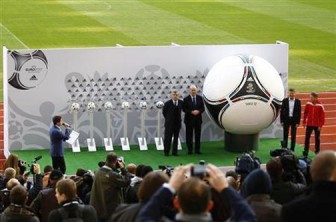KIEV (Reuters) – Traditional rivals Germany and Netherlands will lock horns in a tough group at the 2012 European soccer championship while co-hosts Poland will be hoping that history does not repeat itself when Greece provide the opposition on the opening day next June.
Yesterday’s draw also pitted holders and world champions Spain against Italy with France facing England and co-hosts Ukraine.
The event, the third biggest in global sport after the World Cup and Olympic Games, starts with a reminder of when outsiders Greece gatecrashed the opening day party of 2004 hosts Portugal with a 2-1 win on their way to a stunning tournament triumph.
“I hope that does not happen again, we would not want to experience what Portugal experienced on the first day of Euro 2004,” Poland coach Franciszek Smuda told reporters looking ahead to the June 8 game in Warsaw.

“This is a good draw for us, it’s not a group of death. It’s not an easy group either and it will require a lot of effort to advance.
“Greece have a good team. Everything will depend on the first game in the group against them and whether we win it.”
The flesh was put on the bones of the biggest sporting event to take place in eastern Europe since the 1980 Moscow Olympics when the 16 finalists were drawn into four groups for the competition which runs from June 8 to July 1 next year.
More than 1.4 million visitors are expected to come to Poland and Ukraine and sample the delights of cities as far apart as Gdansk in northern Poland and Donetsk in southern Ukraine, separated by a distance of around 2,500 kilometres.
As well as facing Greece in Group A, Poland will also meet eastern European rivals Russia in Warsaw and the Czech Republic in Wroclaw.
Smuda’s side have a reasonable chance of advancing from the quartet, which is far from the toughest of the four and was kinder than Ukraine’s group.
They have been bracketed with Sweden, England and France in Group D with Ukraine playing their first game against the Swedes in their capital Kiev on June 11.
England will meet France on the same day in Donetsk and the French will be hoping for the same outcome as when they played each other in their opening match of Euro 2004 in Lisbon, two late goals earning Les Bleus a 2-1 win.
Inconsistent France also beat Ukraine 4-1 in a friendly in Donetsk in June and will be one of the championship’s dark horses, a bit like England who will be without the suspended Wayne Rooney for the start of the tournament.
Ukraine coach Oleg Blokhin said: “What can you say apart from you will never face easy opposition in the Euros so whoever we played, it was going to be a challenge. But our stadiums are ready, our people are ready and the players will be ready.”
Group B brought together four strong opponents in the toughest-looking pool with Netherlands, Germany, Denmark and Portugal all renewing old rivalries.
The rivalry between the Germans and the Dutch has evolved into one of the most intense in international soccer dating from the 1974 World Cup final when the then West Germany beat hot favourites Netherlands 2-1 in the final in Munich.
The Dutch gained a modicum of revenge when they beat West Germany 2-1 in the semi-final of Euro ‘88 in Hamburg before going on to be crowned European champions back in Munich.
SPAIN BACKED
The present day Germany, under coach Joachim Loew, are heavily backed to be crowned European champions for a record-extending fourth time thanks to their youth and played superbly to beat the Dutch 3-0 in a friendly in Hamburg last month.
Netherlands, the 2010 World Cup runners-up, are highly-rated too though and their meeting in their second group game in the Ukrainian city of Kharkiv on June 13 should be one of the highlights of the first round.
“It is the toughest group. Netherlands and Portugal have world-class players. We can look forward to very interesting duels,” Loew said.
Portugal and Denmark were in the same qualifying group for the finals, with Denmark coach Morten Olsen commenting: “We all know each other so well, we have beaten them and they have beaten us and it is going to be a very tough group to get through.”
Spain are naturally the favourites, backed to become the first holders to retain the Henri Delaunay trophy, and will face Italy, Ireland and Croatia in a Group C which the southern European superpowers should both advance from. Spain have never beaten Italy in a major tournament apart from a penalty shoot-out win over the Azzurri in the quarter-finals of the last Euros in Vienna in 2008.
The draw brought a wry smile to the face of Ireland’s Italian coach Giovanni Trapattoni, who will face his countrymen for the fourth time since taking charge of Ireland, winning one and drawing twice against the team he used to manage.
“We all know Italy and their strengths so it is not going to be easy,” he said. “But like the last times I have faced them, I will be wanting to beat them on the day.”
The draw was conducted by UEFA general secretary Gianni Infantino at Kiev’s Palace of Arts before a crowd of invited guests and soccer celebrities. He was assisted by four former European champions, Zinedine Zidane of France, Dutch ace Marco Van Basten, Danish goalkeeper Peter Schmeichel and German striker Horst Hrubesch.
The finals will be the third to be co-hosted and will be played at four stadiums in Poland — Warsaw, Gdansk, Wroclaw and Poznan, and four in Ukraine — Kiev, Donetsk, Kharkiv and Lviv.
Euro 2012 will be the last tournament to be staged with 16 teams. The tournament expands to 24 nations at its next edition in 2016 in France.









